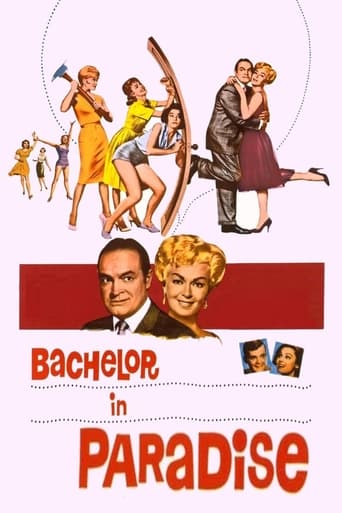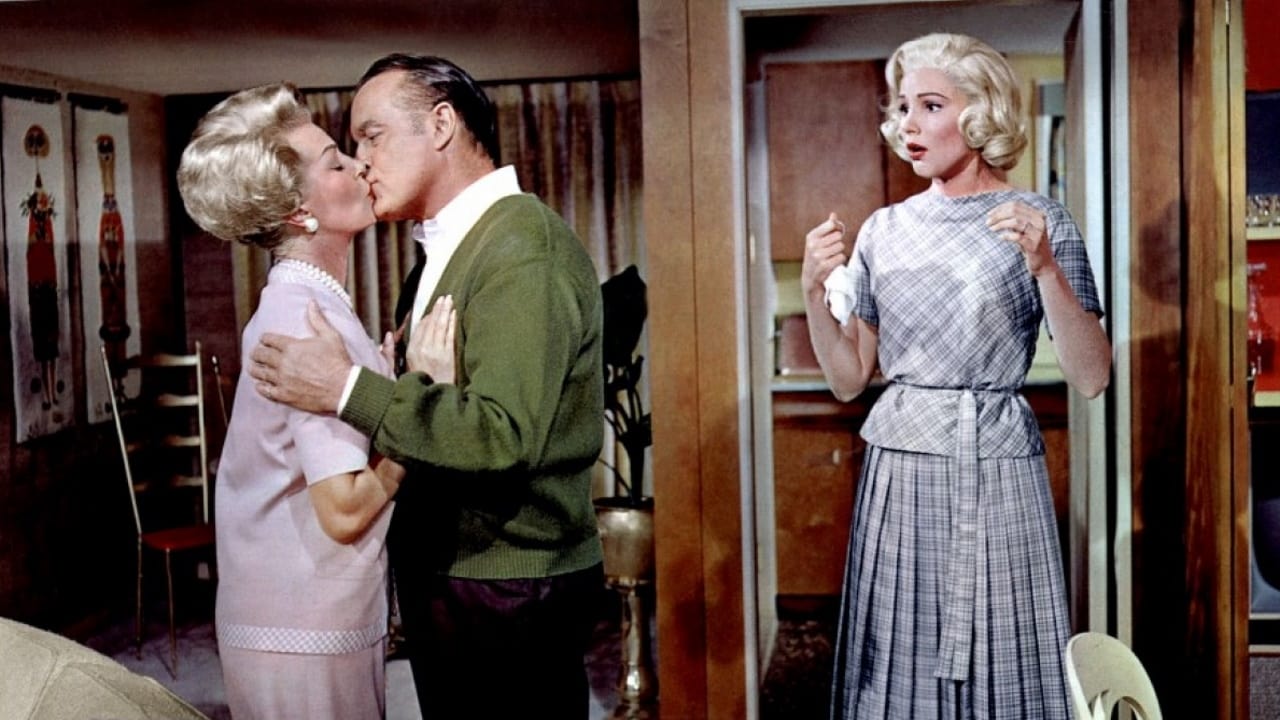jacobs-greenwood
Although this Bob Hope-Lana Turner sex farce comedy will remind many viewers of 1960's era (now syndicated) sitcoms - it features scenes that became staples of such like grocery store accidents ("cleanup on aisle 13!"), laundry machines so filled with soap that they overflow with bubbles, and food burning in the oven - one has to remember that this may have been the first movie to feature such domestic household shenanigans (save Lucille Ball's television programs, of course).Bob Hope fans will be adequately entertained even though there aren't really any laugh out loud moments contained within it. It's not a great comedy by any means, but it is pleasant and, surprisingly, not entirely dated either. Directed by Jack Arnold, it features a screenplay by Valentine Davies and Hal Kanter that was based on a story by Vera Caspary. The title song, by Henry Mancini and Mack David, was nominated for an Academy Award.Hope plays a confirmed bachelor, who's the notorious author (A.J. Niles) of a series of books about the sexual mores in various countries, that has to return to the United States after 14 years abroad because his accountant absconded with much of his earnings and never filed a return for him; hence, he has a back taxes problem with the IRS. So, his publisher (John McGiver) sets him up in a San Fernando Valley suburb called Paradise where, incognito, he can do the research necessary to write a book about "Sex in America" in order to pay his tax bill.Turner, whose character is decidedly single because of a failed relationship in her past, plays the subdivision's property manager whose home he rents while working on the book. Janis Paige, Paula Prentiss (whose husband is played by Jim Hutton, naturally), and Virginia Grey play three of the housewives Hope's undercover character Tommy Randolph gets to know while doing his research (an uncredited Mary Treen plays another). In fact, Randolph ends up hosting cocktail parties for the women as he imparts "how to please your husband" tips while their kids are in school during the day.Ironically, this actually displeases their staid husbands which eventually leads to a petition calling for his eviction, that Turner's character (because she's become interested in the author) refuses to deliver, and then divorce court. Don Porter plays Paradise's developer, who's married to Paige's character but openly pursues Turner's; as one of the husbands, he issues the ultimatum to Randolph. Agnes Moorehead plays the divorce court judge. Florence Sundstrom plays the busybody neighbor who testifies against Randolph, now known to be Niles - there were lots of after hours (and bedroom) situations which could easily be misinterpreted, especially by one going out of their way to be nosy.A predictable ending involving the film's stars, and the only two single characters, is a given.
JohnHowardReid
I'm surprised this movie received such laudable reviews. Although I've now reached the age when I have a lot of trouble remembering even the title of the movie I saw yesterday, let alone what it was about and who was in it, I remember seeing "Bachelor in Paradise" on first release quite well. I enjoyed it far more than the audience did, but I'm still amazed that Hope was nominated for a Golden Globe and actually won the 1962 Laurel Award. The movie has a slow start. It's not until the sequence in which Lana Turner shows Hope over his prospective house that the wisecracks flow thick and fast. Unfortunately, it's the one highlight in an otherwise somewhat pedestrian Hope vehicle that is over-clogged with Miss Turner whose role has obviously been built up. She is such an uninteresting performer, even Prentiss upstages her. She's only effective as a foil for Hope. Her own scenes, especially the one with Porter, are boring. But Sundberg and McGiver make the best of their thin material.
Applause Meter
Bob Hope is AJ Niles, a writer notorious for having penned controversial books on the male/female relationship, and now finds himself exiled to Paradise, that being the name of the California suburban subdivision where he takes refuge. The character of Niles allows Hope full license to play out his comedic persona at its most familiar---the snide, self-satisfied deliveryman of one-liners meant to wither his target. Yes, this is Bob, the iconic performer of the Eisenhower 1950s, an entertainer whose shtick everyone in America was comfortable with. Even when buffoonery is called for, Hope projects arrogance and swagger; a case of the private man intruding into the public image. Lana Turner is Rosemary Howard the real estate agent who rents the house to Niles setting in motion a train of events that disrupt the whole community. Niles just can't help himself, anonymity is against his nature; he becomes the village Yentl, the meddling, intrusive busybody who dislodges the neighborhood's equilibrium and subsequently the lives of its residents. Lana Turner was once a cute, ingénue with acting potential until Hollywood manufactured her into a "glamour goddess." In this movie at age 40, Turner was well established as a self- conscious actress, plaster cast-stiff, without any real depth or emotive spontaneity in her performance. Every mannerism, ever walk is calculated for correct poise and posture. The make-up artists and hair dressers only accentuated this frozen appearance with painfully perfect application of cosmetics and a hair-do that could only be dislodged by a tsunami. There's not much to say about the storyline itself. Disgruntled with this "known libertine and seducer," the husbands sign a petition to evict the Casanova Niles from his home and oust him from the community. The females, excepting a few puritanical matrons, protest this and rally in his defense. Niles was only trying to help them make their marriages more exciting; he was a public servant, a benevolent family counselor. That tall pair of actors Paula Prentiss and Jim Hutton are once again teamed as a romantic couple, here a married one, who are the focus of Nile's ministrations. The movie is dated, a cultural commentary of the era. Unless you're a big fan of Bob Hope or are just interested in opening a time capsule from a world long buried, pass this one by. For being a historical curio, I give it a "3."
suze-4
Bob Hope was 58 and Lana Turner was 40 when they made this movie. They have no chemistry whatsoever so a romance is not believable. Perhaps with softened makeup and hair she would have been appealing. Anyway the story is beside the point now, 45 years later.The movie is all about the huge, spacious, tract developments in undeveloped parts of California in 1961. I lived in one, so this movie takes me back there. Watching it takes me back to those days when Kennedy was the new president, when there were brand new houses in pale pink, light green, and yellow; each house divided from its neighbour by a row of cacti. Families moved to them from the older, two-story traditional houses. It was supposed to be a great thing to have no stairs; to live in a sprawling "rancher." Just looking at the houses with the huge kitchens and wall phones brings nostalgia, as only the very rich can afford space now; back then it was taken for granted.A major "comedic" event in this film is Bob putting too much detergent in the washer, and the ensuing crisis when soap suds flood the entire house. The houses were spacious and everything was inexpensive - such houses were $20,000 new. Nowadays any surviving houses from that era have been remodeled and no longer have the orange built-in bars, the gold appliances, or wood grained walls. This is my parents' world, post-war - 16 years after the end of WW II. This is an era where everything is available, where the kitchen is the size of a restaurant, but there is no happiness whatsoever.A scene in the supermarket is jarring when a little girl who had been left in the car by her mother is talking to Bob Hope and her mother comes along and just leaves her with him as she goes about her shopping. That would never happen now and reminds us of a more innocent and trusting time.The development is called Paradise. It's more like Paradise Lost, or Discarded. There's a dark subplot of an unhappy marriage, a couple that is "practically divorced" and the wife (Janis Paige) is throwing herself at Bob Hope. But he's secretly a gentleman who only has eyes for the stiff, unmarried Lana Turner, and when he finally gets her, there is the obligatory panning across the floor showing their discarded clothing and then we hear her giggles. Just like a Rock Hudson/Doris Day ending.Then the movie ends and I guess maybe we are meant to think they will have a real life together. They're too old to start having kids to populate the housing tract and be ignored and spoiled, so maybe they will write and think and discuss real things and have a happy life together.The sixties are gone - but here in this movie we have the remnants of what it started out to be, if people could only have held on to it and preserved something for the future.Who knew a fluff piece like this would be so thought provoking 40 years later. I thank Turner Classics for realizing these are valuable period pieces that give us insight on a bygone age. An age where people lost the values they had in the 30s and 40s. After the war, people wanted comfort and ease, and wanted their kids to enjoy a carefree life without the privation of the depression and the war. Unfortunately it only shows that comfort and ease do not bring happiness.



 AD
AD




